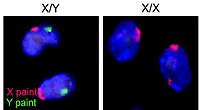| Part of a series on |
| Sex |
|---|
 |
| Biological terms |
| Sexual reproduction |
| Sexuality |
| Sexual system |
Gametogenesis is a biological process by which diploid or haploid precursor cells undergo cell division and differentiation to form mature haploid gametes. Depending on the biological life cycle of the organism, gametogenesis occurs by meiotic division of diploid gametocytes into various gametes, or by mitosis. For example, plants produce gametes through mitosis in gametophytes. The gametophytes grow from haploid spores after sporic meiosis. The existence of a multicellular, haploid phase in the life cycle between meiosis and gametogenesis is also referred to as alternation of generations.
It is the biological process of gametogenesis during which cells that are haploid or diploid divide to create other cells. It can take place either through mitotic or meiotic division of diploid gametocytes into different cells depending on an organism's biological life cycle. For instance, gametophytes in plants undergo mitosis to produce gametes. Both male and female have different forms.[1]
- ^ Saitou, Mitinori; Hayashi, Katsuhiko (2021). "Mammalian in vitro gametogenesis". Science. 374 (6563): eaaz6830. doi:10.1126/science.aaz6830. ISSN 1095-9203. PMID 34591639. S2CID 238238458.